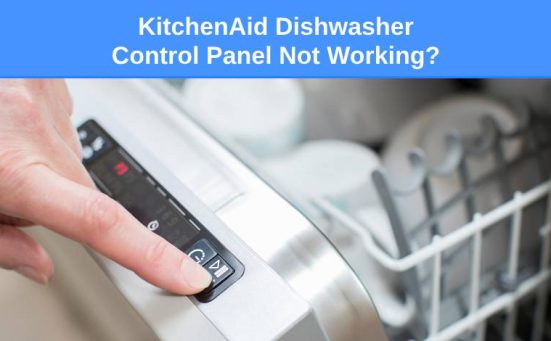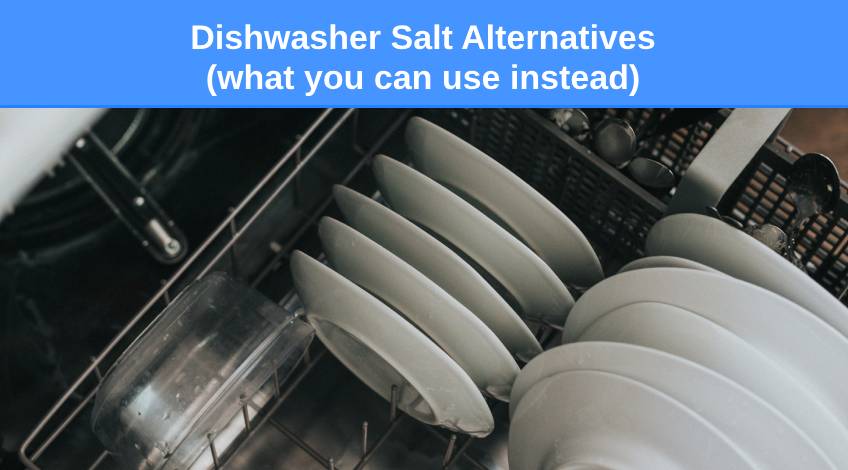
Dishwasher Salt Alternatives (what you can use instead)
If you own a dishwasher you’ll already know that it needs dishwasher salt to run properly. The dishwasher salt ensures that the water used to wash your dishes is soft which allows for the best cleaning results.
But what happens if you run out of dishwasher salt and you need your dishes clean right away? Are there any alternative products that can be used to soften the water in the dishwasher enough to get all of the dishes clean?
If these are questions you have, keep reading. In this article we look at dishwasher salt and find alternative products that can be used in an emergency.
What Is Dishwasher Salt & What Does It Do?
Dishwasher salt is pure 100% NaCl which is different to table salt which has added anti-caking agents. The pure sodium dishwasher salt combines with resin balls inside your dishwasher to absorb water hardness.
Those resin balls have a negative charge whilst the dishwasher salt has a positive charge. The calcium and magnesium which are ever present in hard water swap with the sodium ions which turns that hard water into soft water which is better for cleaning your dishes.
This works until the sodium stores in the resin balls are exhausted, which is when more dishwasher salt is needed to recharge them.
Why Can’t Table Salt Be Used?
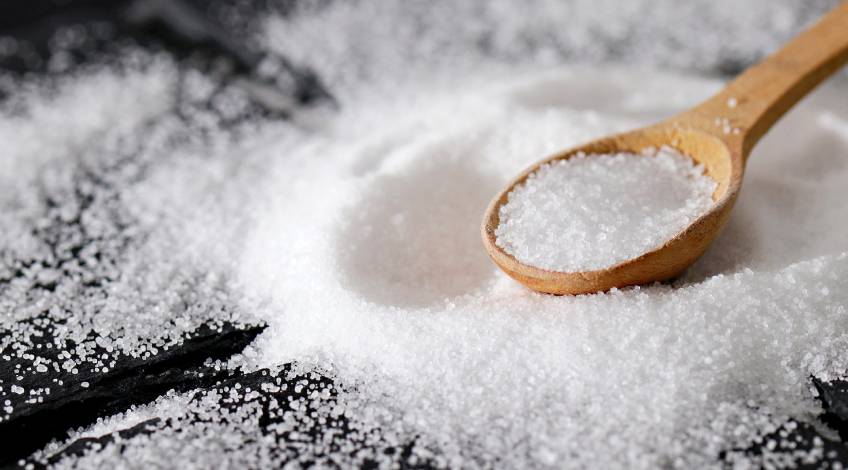
Table salt is also made from sodium, but with added ingredients to prevent it from becoming too solid and not pouring. These added ingredients are typically made from magnesium and/or calcium which prevent the resin balls from removing magnesium/calcium from the water.
This could also cause the tubes and spray nozzles in your dishwasher to become clogged with magnesium and/or calcium (limescale) buildup.
How Much Dishwasher Salt Does The Average Dishwasher Take?
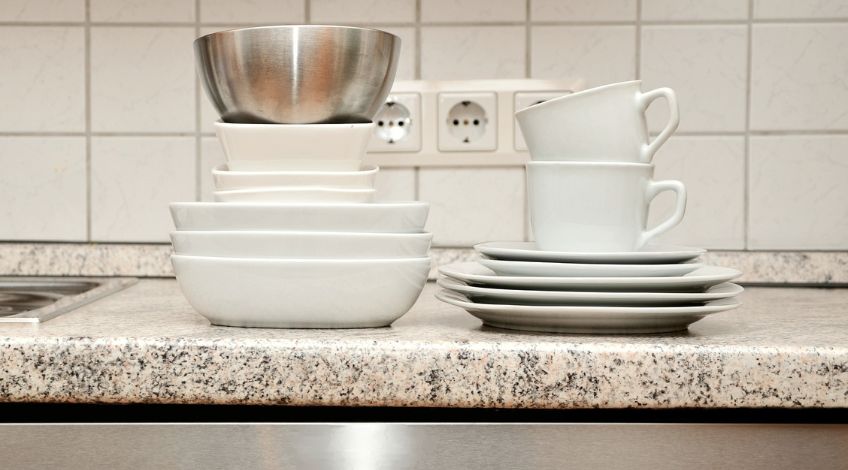
As we have just seen, dishwasher salt ensures that the water used in your dishwasher is soft. This ensures that the detergent washes your dishes properly and leaves them clean. It does this by removing the mineral content from the water which is responsible for forming limescale.
In hard water areas, limescale builds up anywhere that water is heated up to high temperatures. Dishwashers rely on hot water to ensure the detergents are dissolved properly to clean the dishes.
The amount of dishwasher salt needed by your dishwasher will depend on the hardness of the water in your area. If you live in a hard water area (and more than 60% of the UK is), you should pour around 1 kg of dishwasher salt into the salt reservoir whenever the fill salt light is illuminated.
Those of you fortunate enough to live in areas with soft water, will need less dishwasher salt and it won’t need topping up anywhere near as often.
The dishwasher salt reservoir shouldn’t need refilling more than once every 3 months unless you use your dishwasher daily in hard water areas.
If your dishwasher doesn’t have a fill salt light, you will be able to tell when it needs more salt because the dishes won’t be as clean as they previously were.
What Can You Use Instead Of Dishwasher Salt?
If you are in a situation where you absolutely need those dishes clean right now but have no dishwasher salt, there are a few alternatives you can use. These include;
Using White Vinegar Instead Of Dishwasher Salt
- PERFECT FOR COOKING - Use in vinaigrettes, sweet-and-sour dishes, marinades, pickles, chutneys, and butter sauces. Or infuse with fresh herbs to make flavoured vinegar. Whatever the occasion our Fresh White wine vinegar will be perfect.
- FABRIC SOFTENER - This white vinegar is perfect for households that have pets and children around as well as commercial premises where health and safety is of paramount importance
White vinegar will work to help remove limescale deposits from hard water. The white vinegar should either be put in the same area that the detergent is put or in a small bowl placed on the top rack of the dishwasher.
You should never pour white vinegar into the dishwasher salt reservoir and it should only be used in an emergency. The acidic properties of vinegar work in the same way as the dishwasher salt in removing limescale from the water, but could also cause corrosion to rubber, plastic and metal components if used regularly in the dishwasher.
It should also be noted that using vinegar in place of dishwasher salt could technically void any warranty you have on your dishwasher.
Adding Bicarbonate Of Soda In Place Of Dishwasher Salt
- MAKE KITCHENS & BATHROOMS SPARKLE: Sodium Bicarbonate has natural cleaning and deodorising properties which can remove grime and odours from fridges, microwaves, ovens, barbecues, grills or kitchen implements in need of something stronger than elbow grease. It works as a fantastic bathroom cleaning essential too: use on porcelain, plastic, stainless steel, tiles and more to remove grime, mildew or water stains with a more natural solution.
- FCC 100% FOOD GRADE SODIUM BICARBONATE PERFECT FOR COOKING & BAKING: Raise your soda bread dough, create airy chocolate sponge, moist fruitcakes, gingerbread or carrot cake. Pair baking soda with an acid with moisture such as milk or yoghurt for the perfect taste and a versatile solution for making delicious treats for personal or commercial use! Please note Sodium Bicarb is also gluten-free and safe for coeliacs.
Using bicarbonate of soda in place of dishwasher salt is another temporary measure and should not be considered a long term replacement for dishwasher salt.
Simply sprinkle 1 tablespoon of bicarb into the dishwasher, not in the salt reservoir. If you were to put the bicarb into the salt reservoir it could create a foam which could cause damage to some of the internal components of the dishwasher.
Are There Alternatives To Dishwasher Salt That Should Not Be Used?
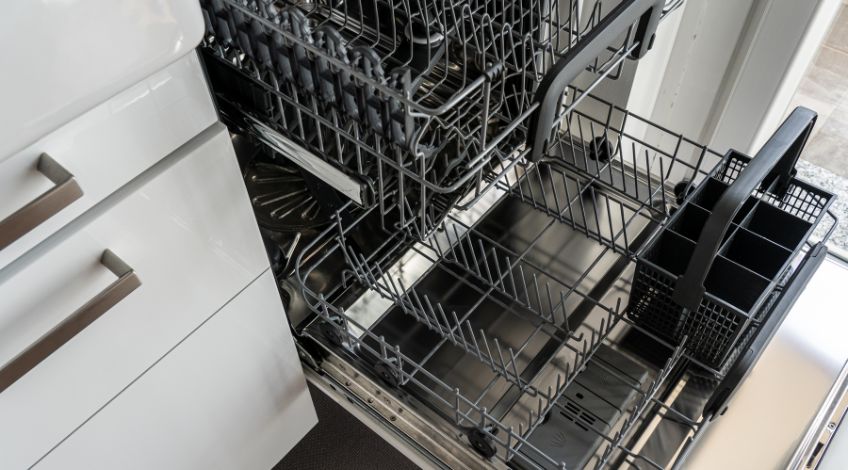
You could be tempted to use table salt, kosher salt or even rock salt in the salt reservoir in an emergency but this is not advisable. These salts are too fine and could cause the reservoir to become clogged over time.
Do You Need To Use Dishwasher Salt With Dishwasher Tablets?
Many of the dishwasher tablets available in the stores contain detergent, rinse aid and salt. This means that technically you don’t need to use dishwasher salt when using these 3-in-1 tablets or pods.
However, you should always check the packaging because sometimes they recommend ensuring the reservoir is topped up with salt. This is especially true if you live in a hard water area.
Whether you use 3-in-1 tablets or not it is always best practice to fill up the salt reservoir as and when required.
Will Not Using Dishwasher Salt Damage The Dishwasher?
Using the dishwasher once or twice without having salt in the reservoir is unlikely to cause any damage. But if you neglect to fill the salt reservoir and use your dishwasher regularly, it will almost certainly suffer from some damage.
The frequent omission of dishwasher salt will lead to a build up of limescale in the tubes and nozzles of your appliance that could make them beyond repair.
This would result in expensive repairs or you might need to replace the dishwasher with a new one.
SEE ALSO: What Does Dishwasher Salt Do? (and where to put it)
Frequently Asked Questions
No, you should never use normal salt instead of dishwasher salt. Normal salt or table salt contains added anti-caking agents that could cause problems with the resin balls that deal with limescale in a dishwasher.
As a short term solution to running out of dishwasher salt, you could sprinkle 1 teaspoon of bicarbonate of soda in the dishwasher. Don’t put the bicarb in the salt reservoir as this could be disastrous.
If the dishwasher runs out of salt, the minerals that are present in hard water will begin to clog the tubes and nozzles of your dishwasher and the detergent will fail to clean the dishes as effectively as before.
You can use white vinegar instead of dishwasher salt but only as a temporary measure. The white vinegar should be placed in the area where the detergent is placed or poured into a small dish and placed on the top rack. Never pour vinegar into the salt reservoir.



